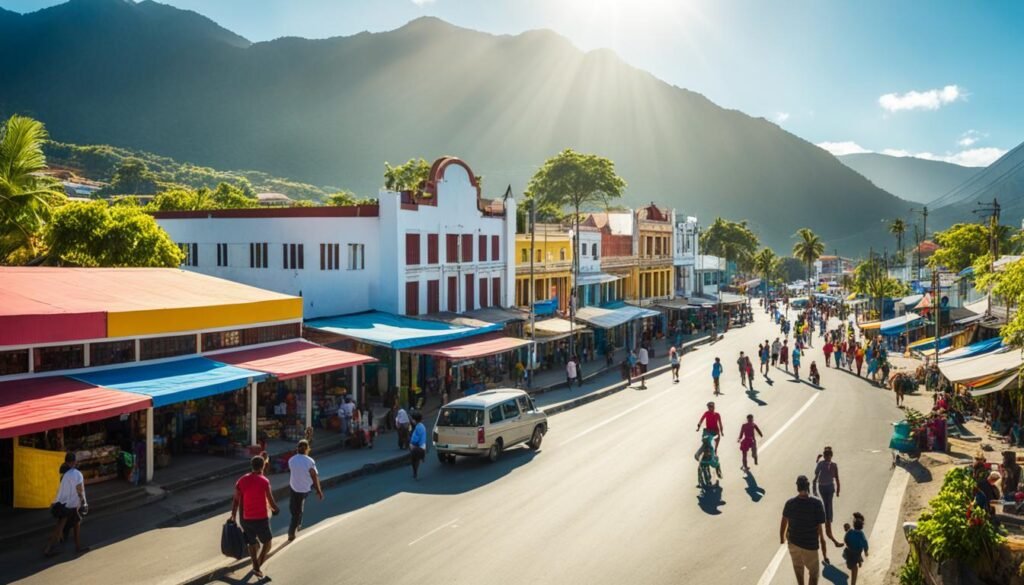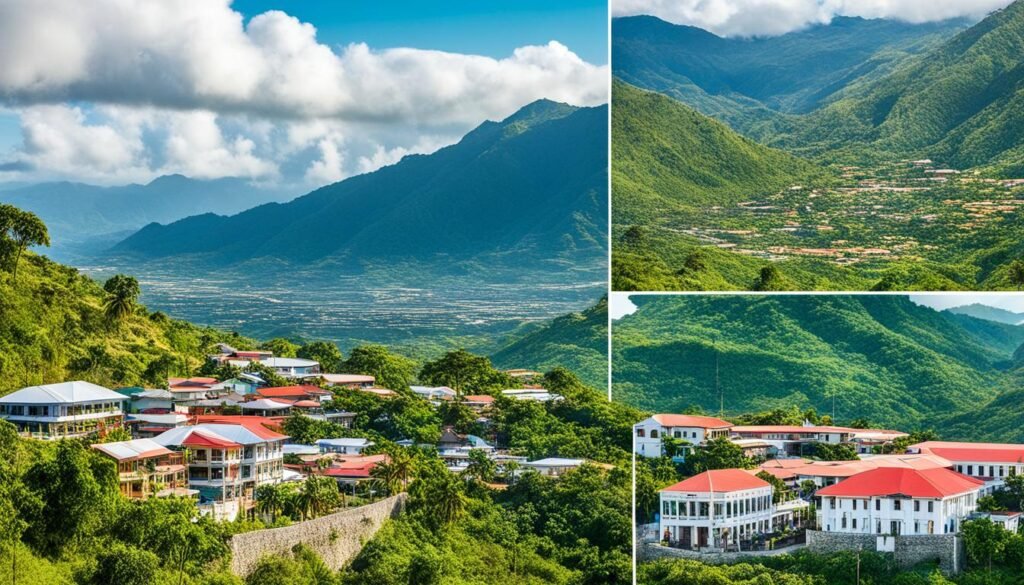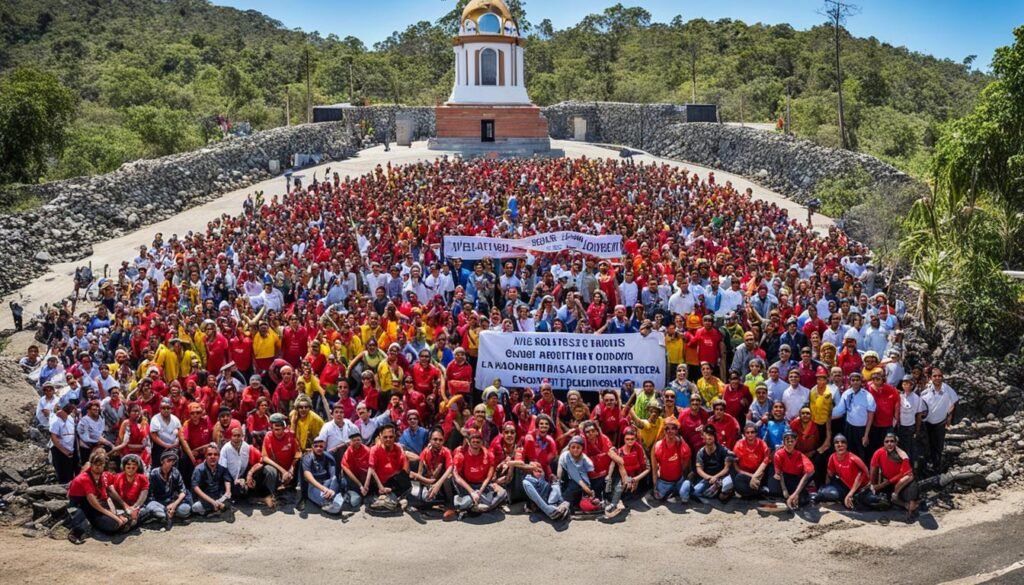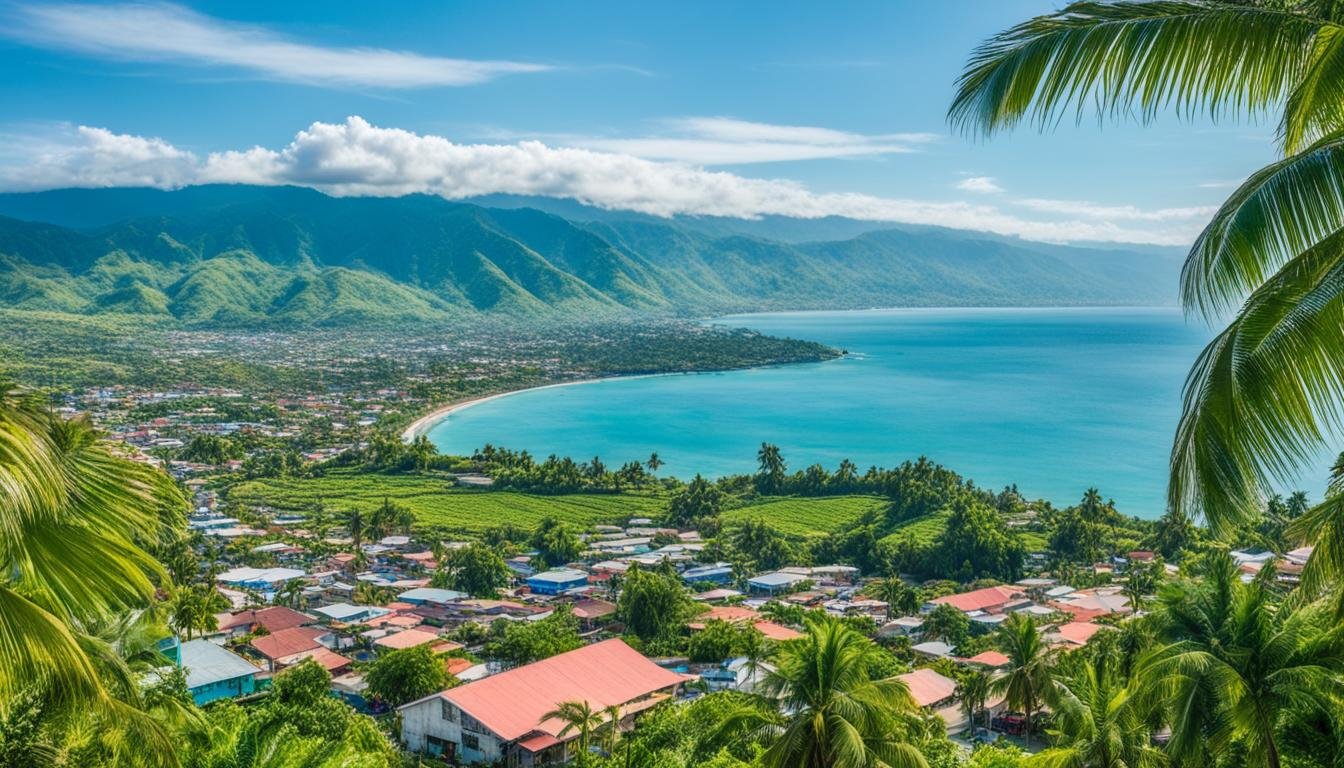Imagine a nation rising from the ashes of a tumultuous past, where the path to prosperity is paved with resilience and determination. That is the story of East Timor, a small Southeast Asian country that has captivated the world with its celebrated journey to statehood. However, this remarkable tale is not without its complexities, as the 2006 crisis unraveled the post-independence dream, leaving the country’s future in uncertainty.
This article delves into the heart of East Timor’s post-conflict development studies, exploring the challenges and opportunities that have shaped the nation’s trajectory. From the monopolization of violence to the generation of capital accumulation, the theoretical framework of state-building provides a lens through which to understand Timor-Leste’s remarkable resilience and the role of cities in driving internal integration.
Key Takeaways
- East Timor’s celebrated journey to statehood and the 2006 crisis that unraveled the post-independence dream
- The importance of monopolizing violence, generating capital accumulation, and gaining political legitimacy in post-conflict state-building
- The role of cities, such as Dili, in driving state-making and internal integration
- The pre-existing political economy and the international community’s state-building agenda since 1999
- The challenges of economic disintegration, urban challenges, and the failure of Dili to drive state-making and internal integration
Introduction to Timor-Leste’s Post-Conflict Journey
Timor-Leste’s celebrated journey to statehood was marred by a violent unraveling in 2006, leaving the country’s post-independence dream in shambles. An internal military dispute, stoked by political elites, spilled over into protest and identity-based gang violence on the streets of Dili, the national capital. This crisis forced Prime Minister Mari Alkatiri to resign, put half the urban population in IDP camps, led to the return of international peacekeepers, and left the post-independence dream in tatters.
Timor-Leste’s Celebrated Journey to Statehood
Timor-Leste, formerly known as East Timor, had long struggled for independence from foreign rule, including Portuguese colonization and Indonesian occupation. The country’s journey to statehood was celebrated as a triumph of self-determination and international support for its people’s aspirations.
The 2006 Crisis and Unraveling of the Post-Independence Dream
The fragile post-independence period was shattered by the 2006 crisis, which exposed the underlying governance challenges facing the young nation. The internal military dispute and subsequent violence on the streets of Dili highlighted the country’s struggle to consolidate its newfound Timor-Leste statehood and maintain stability in the aftermath of the post-conflict transition.
The paper explores the reasons behind Timor-Leste’s stumble, despite the overwhelming national consensus for independence and firm international support for rebuilding, shedding light on the complex dynamics of post-conflict development and state-building in the country.

Theoretical Framework of State-Building
Building a strong, stable state in the aftermath of conflict is a complex process that requires a nuanced understanding of the interplay between monopolizing violence, capital accumulation, and political legitimacy. This theoretical framework is crucial for understanding the challenges faced by post-conflict states like Timor-Leste as they navigate the path to sustainable development and internal integration.
Monopolizing Violence and Generating Capital Accumulation
The ability of the state to monopolize violence is a key component of state-building. By maintaining a monopoly on the legitimate use of force, the state can keep conflict within the political sphere and encourage processes of economic accumulation beyond predation. This, in turn, facilitates the state’s ability to generate the capital necessary for infrastructure development, public services, and overall economic growth.
Gaining Political Legitimacy in Post-Conflict States
Securing political legitimacy is also vital for the long-term viability of the state in post-conflict settings. Many post-conflict states, including Timor-Leste, inherit an externally imposed formal democracy that is vulnerable to political instability. Gaining the trust and support of the population through inclusive governance, effective service delivery, and addressing the root causes of the conflict is essential for building a stable and legitimate state.
By understanding the interplay between monopolizing violence, capital accumulation, and political legitimacy, policymakers and practitioners can develop more effective strategies for state-building in Timor-Leste and other post-conflict contexts.
The Role of Cities in State-Building and Internal Integration
Cities play a pivotal role in the state-building process and the internal integration of a country. Dili, the capital of Timor-Leste, is a prime example of how urban centers can shape the fortunes of state-making under conditions of globalization and crisis. Timor-Leste’s journey from a post-conflict nation to a fledgling state has been heavily influenced by the dynamics within its largest city.
The paper argues that Dili, as the seat of political power and economic activity, serves as the key site of “internal integration” – the process by which a state consolidates its control and authority over the entire national territory. This is a crucial element of successful state-building, as it allows the government to establish its presence and legitimacy across the country, fostering a sense of national unity and identity.
However, the urban challenges faced by Dili, such as rapid urbanization, informal settlements, and a lack of basic infrastructure, have hindered the state’s ability to effectively integrate the country. These issues have contributed to the uneven development between the capital and the rural areas, undermining the state’s efforts to solidify its control and project its authority throughout Timor-Leste.
The role of cities in state-building and internal integration is a critical aspect of understanding Timor-Leste’s post-conflict development. By examining the dynamics within Dili, researchers can gain valuable insights into the complexities of state formation and the challenges faced by emerging nations in the global era.
East Timor: Post-conflict development studies Dili East Timor
Timor-Leste, formerly known as East Timor, has been the subject of extensive post-conflict development studies, with a particular focus on the capital city of Dili. The country’s journey to statehood has been celebrated, but it has also faced significant challenges in the aftermath of the 2006 crisis, which unraveled the post-independence dream.
The paper examines the processes of state-building that took place in Timor-Leste under Portuguese and Indonesian occupation, as well as the role of the international community post-1999. It concludes that the donor-scripted state-building model for Timor-Leste was ultimately inappropriate, precipitating an urban crisis in Dili and the city’s failure to drive state-making and ‘internal integration’ in the country at large.

The study of East Timor’s post-conflict development provides valuable insights into the challenges faced by states in the process of rebuilding and reintegrating after periods of conflict and instability. The role of cities, such as Dili, in this process is particularly important, as they often serve as the locus of state-building efforts and the drivers of economic and social integration.
Overall, the post-conflict development studies in Dili, East Timor, offer a nuanced understanding of the complexities and pitfalls of state-building in the aftermath of conflict, and the importance of tailoring development strategies to the unique cultural, political, and economic realities of the local context.
Pre-Existing Political Economy of State-Building in Timor-Leste
Timor-Leste’s path to statehood has been shaped by its complex and tumultuous history. The country’s political economy has been heavily influenced by its past experiences under Portuguese rule and Indonesian occupation. These historical processes have left an indelible mark on Timor-Leste’s trajectory towards independence and the subsequent challenges it has faced in the post-conflict era.
Portuguese Rule and Indonesian Occupation
Timor-Leste’s colonial history dates back to the 16th century, when it came under Portuguese rule. The Portuguese presence in the region was characterized by a exploitative economic system that prioritized the extraction of natural resources and the subjugation of the local population. This laid the groundwork for a deeply unequal and centralized political structure that would persist long after the country’s independence.
The subsequent Indonesian occupation of Timor-Leste, which lasted from 1975 to 1999, further exacerbated the country’s political and economic challenges. The Indonesian government’s policies of repression and resource extraction only served to reinforce the existing power structures and perpetuate the country’s dependence on external forces. This period also saw the rise of a strong resistance movement, which would eventually pave the way for Timor-Leste’s hard-won independence.

The legacy of these historical experiences continues to shape Timor-Leste’s political economy today, as the country grapples with the task of state-building and economic development in the aftermath of conflict. Understanding the pre-existing conditions that have influenced the country’s trajectory is essential for addressing the complex challenges it faces in the post-conflict era.
International Community’s State-Building Agenda since 1999
Since Timor-Leste’s independence in 1999, the international community has played a pivotal role in shaping the country’s state-building agenda. Following the tumultuous transition from Indonesian occupation, the international community led by the United Nations (UN) launched a comprehensive state-building program to help Timor-Leste establish a stable and functional government.
At the heart of this agenda was the goal of building effective state institutions, monopolizing the use of violence, and generating capital accumulation to support Timor-Leste’s post-conflict development. The international community provided substantial financial aid, technical assistance, and peacekeeping forces to support Timor-Leste’s fledgling government in the years following the 1999 referendum.

However, the implementation of the state-building agenda in Timor-Leste has faced numerous challenges. The country’s long history of Portuguese rule and Indonesian occupation had left a complex political and economic landscape, which the international community struggled to navigate effectively. The 2006 crisis, which saw the unraveling of the post-independence dream, further complicated the state-building process and highlighted the need for a more nuanced and context-specific approach.
As Timor-Leste continues to grapple with the legacy of its past and the ongoing efforts to build a stable and prosperous nation, the role of the international community remains a crucial yet complex factor in the country’s development trajectory.
Consequences of Implementing the State-Building Agenda
Timor-Leste’s journey towards statehood has been heavily influenced by the international community’s state-building agenda. However, the implementation of this agenda has led to significant consequences, including economic disintegration and urban challenges in the capital city of Dili.
Economic Disintegration and Urban Challenges
The state-building agenda in Timor-Leste has been characterized by a small government, conservative macro-economic framework, and an over-reliance on failed private sector and agrarian growth strategies. This has driven unemployment, inequality, and deprivation on the streets of Dili, the country’s capital. The reconstruction boom in the city was short-lived and highly unequal, further exacerbating the economic challenges faced by its residents.
Dili’s Failure to Drive State-Making and Internal Integration
Rather than serving as a hub for state-making and internal integration, Dili has become a microcosm of the failures in Timor-Leste’s state-building efforts. Economic disintegration and political and violent challenges to the state have been profoundly urban in nature, undermining the city’s role in driving the country’s state-making process.
The consequences of implementing the state-building agenda in Timor-Leste have been far-reaching, with Dili serving as a testament to the challenges faced in translating international blueprints into effective state-making and internal integration. The city’s struggles with economic disintegration and urban challenges have highlighted the need for a more contextualized and holistic approach to post-conflict development in the country.
Customary Land Tenure Systems and Rural Livelihoods
In Timor-Leste, the intricate web of customary land tenure systems plays a vital role in supporting diverse rural livelihoods. These traditional institutions have endured for centuries, providing a framework for communities to manage and access land resources. As the government of Timor-Leste considers land tenure reform, it is crucial to recognize the importance of these customary practices and their relationship with the country’s economic and social development.
Importance of Customary Institutions in Land Tenure Reform
Customary land tenure systems in Timor-Leste are deeply rooted in the cultural and social fabric of rural communities. These systems have evolved over time to meet the needs of the people, ensuring equitable access to land and natural resources. They have also played a vital role in supporting diverse rural livelihoods, from subsistence farming to small-scale entrepreneurship. As Timor-Leste contemplates land tenure reform, it is essential to consider the potential impact on these customary institutions and the livelihoods they sustain.
The proposed land tenure reform in Timor-Leste aims to address issues of land ownership and management, with the goal of promoting economic development and improving infrastructure. However, the potential privatization and state appropriation of land may disrupt the delicate balance of customary land tenure systems, potentially undermining the rural livelihoods that have been the backbone of Timor-Leste’s communities for generations. It is crucial that policymakers carefully consider the interplay between customary land tenure, rural livelihoods, and the broader goals of land tenure reform in Timor-Leste.
Timor-Leste’s Political Stability and Economic Challenges
As Timor-Leste continues its post-conflict development journey, the country has achieved remarkable political stability in recent years. However, the nation still faces significant economic challenges that require a strategic approach to ensure sustainable growth.
Timor-Leste’s economy heavily relies on the Petroleum Fund, which is expected to run out by 2034. This heavy dependence on oil revenue poses a threat to the country’s long-term financial stability. To address this, the government must prioritize fiscal reforms and economic diversification to reduce the country’s reliance on a single resource.
The pursuit of economic diversification is crucial for Timor-Leste, as it will help the country develop new industries and create more employment opportunities for its citizens. This, in turn, will contribute to the overall political and social stability of the nation.
Achieving this balance between political stability and economic challenges requires a comprehensive and strategic approach from the Timor-Leste government. Through prudent fiscal reforms and a focus on economic diversification, the country can secure a more sustainable future for its people and cement its position as a stable and prosperous nation in the region.
Overcoming Challenges: Issues for the Timor-Leste Government
As Timor-Leste continues its post-conflict journey, the government faces critical challenges that require strategic attention. Two key areas that demand immediate focus are fiscal reforms and economic diversification.
Fiscal Reforms and Economic Diversification
Timor-Leste’s reliance on oil and gas revenues has created an unsustainable economic model. The Timor-Leste government must implement robust fiscal reforms to reduce its dependency on finite natural resources and foster a more diversified economy. This will involve diversifying revenue streams, promoting non-oil sector growth, and ensuring prudent management of the country’s limited financial resources.
Improving Administrative Capacity and Policy Implementation
Strengthening the Timor-Leste government’s administrative capacity is crucial for effective policy implementation and service delivery. Investing in human capital development, streamlining bureaucratic processes, and enhancing coordination between government agencies can help the country overcome its challenges and deliver tangible improvements in the lives of its citizens.
By addressing these key issues, the Timor-Leste government can pave the way for a more resilient and prosperous future, ultimately benefiting the people of this young nation.
Conclusion
The journey of Timor-Leste since its independence has been a complex and challenging one. The paper has assessed the competing explanations for the 2006 crisis in the country and offered modest options for the future. It is evident that Timor-Leste’s post-conflict development and state-building efforts have faced numerous obstacles, ranging from economic disintegration and urban challenges to the uneven implementation of policies and the need to balance customary land tenure systems with modern governance structures.
The Timor-Leste government and the international community must work together to address these challenges and unlock the country’s potential for sustainable development. This will require fiscal reforms, economic diversification, and improvements in administrative capacity and policy implementation. By leveraging its unique cultural heritage and natural resources, Timor-Leste can chart a path towards greater political stability, economic prosperity, and social cohesion.
As Timor-Leste continues to navigate its post-conflict journey, the lessons learned from its experiences can provide valuable insights for other nations facing similar challenges. The road ahead may be long and arduous, but with a steadfast commitment to inclusive development and good governance, Timor-Leste can realize its aspirations for a brighter future.
Source Links
- Statemaking and the Post-Conflict City – https://www.lse.ac.uk/international-development/Assets/Documents/PDFs/csrc-working-papers-phase-two/wp32.2-statemaking-and-post-conflict-city.pdf
- Land access and livelihoods in post-conflict Timor-Leste: no magic bullets | International Journal of the Commons – https://thecommonsjournal.org/articles/10.18352/ijc.514
- Over 20 years since independence, how can Timor-Leste’s fragile stability be transformed into development? | List of Articles | International Information Network Analysis | SPF – https://www.spf.org/iina/en/articles/sakane_09.html


